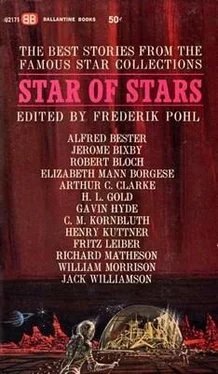Альфред Бестер - Disappearing Act
Здесь есть возможность читать онлайн «Альфред Бестер - Disappearing Act» весь текст электронной книги совершенно бесплатно (целиком полную версию без сокращений). В некоторых случаях можно слушать аудио, скачать через торрент в формате fb2 и присутствует краткое содержание. Год выпуска: 1960, Издательство: Ballantine Books, Жанр: Фантастика и фэнтези, на английском языке. Описание произведения, (предисловие) а так же отзывы посетителей доступны на портале библиотеки ЛибКат.
- Название:Disappearing Act
- Автор:
- Издательство:Ballantine Books
- Жанр:
- Год:1960
- ISBN:нет данных
- Рейтинг книги:5 / 5. Голосов: 1
-
Избранное:Добавить в избранное
- Отзывы:
-
Ваша оценка:
- 100
- 1
- 2
- 3
- 4
- 5
Disappearing Act: краткое содержание, описание и аннотация
Предлагаем к чтению аннотацию, описание, краткое содержание или предисловие (зависит от того, что написал сам автор книги «Disappearing Act»). Если вы не нашли необходимую информацию о книге — напишите в комментариях, мы постараемся отыскать её.
Disappearing Act — читать онлайн бесплатно полную книгу (весь текст) целиком
Ниже представлен текст книги, разбитый по страницам. Система сохранения места последней прочитанной страницы, позволяет с удобством читать онлайн бесплатно книгу «Disappearing Act», без необходимости каждый раз заново искать на чём Вы остановились. Поставьте закладку, и сможете в любой момент перейти на страницу, на которой закончили чтение.
Интервал:
Закладка:
Dimmock stuttered and fumbled. Finally he explained that it was a special ward set up for special combat cases. Shock cases.
“Then you do have patients in the ward?”
“Yes, sir. Ten women and fourteen men.”
Carpenter brandished a sheaf of reports. “Says here the St. Albans patients claim nobody’s in Ward T.”
Dimmock was shocked. That was untrue, he assured the general.
“All right, Dimmock. So you’ve got your twenty-four crocks in there. Their job’s to get well. Your job’s to cure them. What the hell’s upsetting the hospital about that?”
“W-Well, sir. Perhaps it’s because we keep them locked up.”
“You keep Ward T locked?”
“Yes, sir.”
“Why?”
“To keep the patients in, General Carpenter.”
“Keep ‘em in? What d’you mean? Are they trying to get out? They violent, or something?”
“No, sir. Not violent.”
“Diinmock, I don’t like your attitude. You’re acting damned sneaky and evasive. And I’ll tell you something else I don’t like. That T classification. I checked with a Filing Expert from the Medical Corps and there is no T classification. What the hell are you up to at St. Albans?”
“W-Well, sir. . . We invented the T classification. It . . . They. . . They’re rather special cases, sir. We don’t know what to do about them or how to handle them. W-We’ve been trying to keep it quiet until we’ve worked out a modus operandi, but it’s brand new, General Carpenter. Brand new!” Here the expert in Dinimock triumphed over discipline. “It’s sensational. It’ll make medical history, by God! It’s the biggest damned thing ever.”
“What is it, Dimmock? Be specific.”
“Well, sir, they’re shock cases. Blanked out. Almost catatonic. Very little respiration. Slow pulse. No response.”
“I’ve seen thousands of shock cases like that,” Carpenter grunted. “What’s so unusual?”
“Yes, sir. So far it sounds like the standard Q or R classification. But here’s something unusual. They don’t eat and they don’t sleep.”
“Never?”
“Some of them never.”
“Then why don’t they die?”
“We don’t know. The metabolism cycle’s broken, but only on the anabolism side. Catabolism continues. In other words, sir, they’re eliminating waste products but they’re not taking anything in. They’re eliminating fatigue poisons and rebuilding worn tissue, but without sleep. God knows how. It’s fantastic.”
“That why you’ve got them locked up? Mean to say. . . D’you suspect them of stealing food and cat naps somewhere else?”
“N-No, sir.” Dimmock looked shamefaced. “I don’t know how to tell you this, General Carpenter. I. . . We lock them up because of the real mystery. They. . . Well, they disappear.”
“They what?”
“They disappear, sir. Vanish. Right before your eyes.”
“The hell you say.”
“I do say, sir. They’ll be sitting on a bed or standing around. One minute you see them, the next minute you don’t. Sometimes there’s two dozen in Ward T. Other times none. They disappear and reappear without rhyme or reason. That’s why we’ve got the ward locked, General Carpenter. In the entire history of combat and combat injury there’s never been a case like this before. We don’t know how to handle it.”
“Bring me three of those cases,” General Carpenter said.
Nathan Riley ate French toast, eggs benedict; consumed two quarts of brown ale, smoked a John Drew, belched delicately and arose from the breakfast table. He nodded quietly to Gentleman Jim Corbett, who broke off his conversation with Diamond Jim Brady to intercept him on the way to the cashier’s desk.
“Who do you like for the pennant this year, Nat?” Gentleman Jim inquired.
“The Dodgers,” Nathan Riley answered.
“They’ve got no pitching.”
“They’ve got Snider and Furillo and Campanella. They’ll take the pennant this year, Jim. I’ll bet they take it earlier than any team ever did. By September 13th. Make a note. See if I’m right.”
“You’re always right, Nat,” Corbett said.
Riley smiled, paid his check, sauntered out into the street and caught a horsecar bound for Madison Square Garden. He got off at the corner of 50th and Eighth Avenue and walked upstairs to a handbook office over a radio repair shop. The bookie glanced at him, produced an envelope and counted out fifteen thousand dollars.
“Rocky Marciano by a TKO over Roland La Starza in the eleventh,” he said. “How the hell do you call them so accurate, Nat?”
“That’s the way I make a living,” Riley smiled. “Are you making book on the elections?”
“Eisenhower twelve to five. Stevenson—”
“Never mind Adlai.” Riley placed twenty thousand dollars on the counter. “I’m backing Ike. Get this down for me.”
He left the handbook office and went to his suite in the Waldorf where a tall, thin young man was waiting for him anxiously.
“Oh yes,” Nathan Riley said. “You’re Ford, aren’t you? Harold Ford?”
“Henry Ford, Mr. Riley.”
“And you need financing for that machine in your bicycle shop. What’s it called?”
“I call it an Ipsimobile, Mr. Riley.”
“Hmmm. Can’t say I like that name. Why not call it an automobile?”
“That’s a wonderful suggestion, Mr. Riley. I’ll certainly take it.”
“I like you, Henry. You’re young, eager, adaptable. I believe in your future and I believe in your automobile. I’ll invest two hundred thousand dollars in your company.”
Riley wrote a check and ushered Henry Ford out. He glanced at his watch and suddenly felt impelled to go back and look around for a moment. He entered his bedroom, undressed, put on a gray shirt and gray slacks. Across the pocket of the shirt were large blue letters: U.S.A.H.
He locked the bedroom door and disappeared.
He reappeared in Ward T of the United States Army Hospital in St. Albans, standing alongside his bed which was one of twenty-four lining the walls of a long, light steel barracks. Before he could draw another breath, he was seized by three pairs of hands. Before he could struggle, he was shot by a pneumatic syringe and poleaxed by 1½ cc of sodium thiomorphate.
“We’ve got one,” someone said.
“Hang around,” someone else answered. “General Carpenter said he wanted three.”
After Marcus Junius Brutus left her bed, Lela Machan clapped her hands. Her slave women entered the chamber and prepared her bath. She bathed, dressed, scented herself and breakfasted on Smyrna figs, rose oranges and a flagon of Lacrima Christi. Then she smoked a cigarette and ordered her litter.
The gates of her house were crowded as usual by adoring hordes from the Twentieth Legion. Two centurions removed her chair-bearers from the poles of the litter and bore her on their stout shoulders. Lela Machan smiled. A young man in a sapphire-blue cloak thrust through the mob and ran toward her. A knife flashed in his hand. Lela braced herself to meet death bravely.
“Lady!” he cried. “Lady Lela!”
He slashed his left arm with the knife and let the crimson blood stain her robe.
“This blood of mine is the least I have to give you,” he cried.
Lela touched his forehead gently.
“Silly boy,” she murmured. “Why?”
“For love of you, my lady.”
“You will be admitted tonight at nine,” Lela whispered. He stared at her until she laughed. “I promise you. What is your name, pretty boy?”
“Ben Hur.”
“Tonight at nine, Ben Hur.”
The litter moved on. Outside the forum, Julius Caesar passed in hot argument with Marcus Antonius, Antony. When he saw the litter he motioned sharply to the centurions, who stopped at once. Caesar swept back the curtains and stared at Lela, who regarded him languidly. Caesar’s face twitched.
Читать дальшеИнтервал:
Закладка:
Похожие книги на «Disappearing Act»
Представляем Вашему вниманию похожие книги на «Disappearing Act» списком для выбора. Мы отобрали схожую по названию и смыслу литературу в надежде предоставить читателям больше вариантов отыскать новые, интересные, ещё непрочитанные произведения.
Обсуждение, отзывы о книге «Disappearing Act» и просто собственные мнения читателей. Оставьте ваши комментарии, напишите, что Вы думаете о произведении, его смысле или главных героях. Укажите что конкретно понравилось, а что нет, и почему Вы так считаете.








![Альфред Бестер - Star of Stars [Anthology]](/books/398777/alfred-bester-star-of-stars-anthology-thumb.webp)
![Альфред Бестер - Миры Альфреда Бестера. Том 3 [Авторский сборник]](/books/405485/alfred-bester-miry-alfreda-bestera-tom-3-avtor-thumb.webp)
![Альфред Бестер - Тигр! Тигр! [сборник litres]](/books/417785/alfred-bester-tigr-tigr-sbornik-litres-thumb.webp)